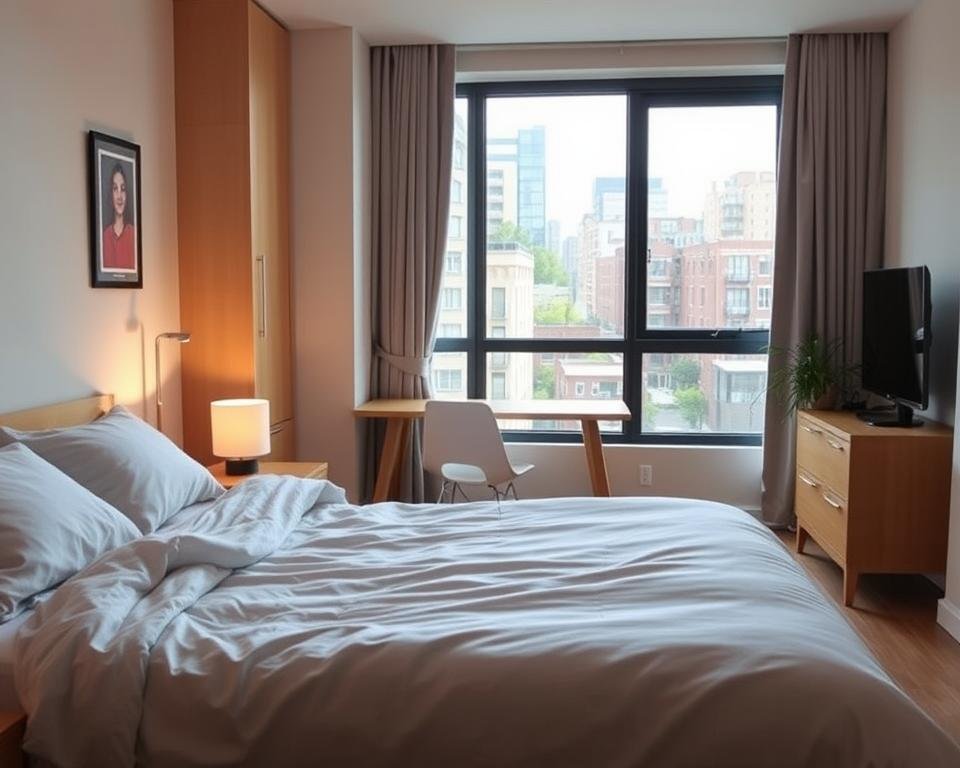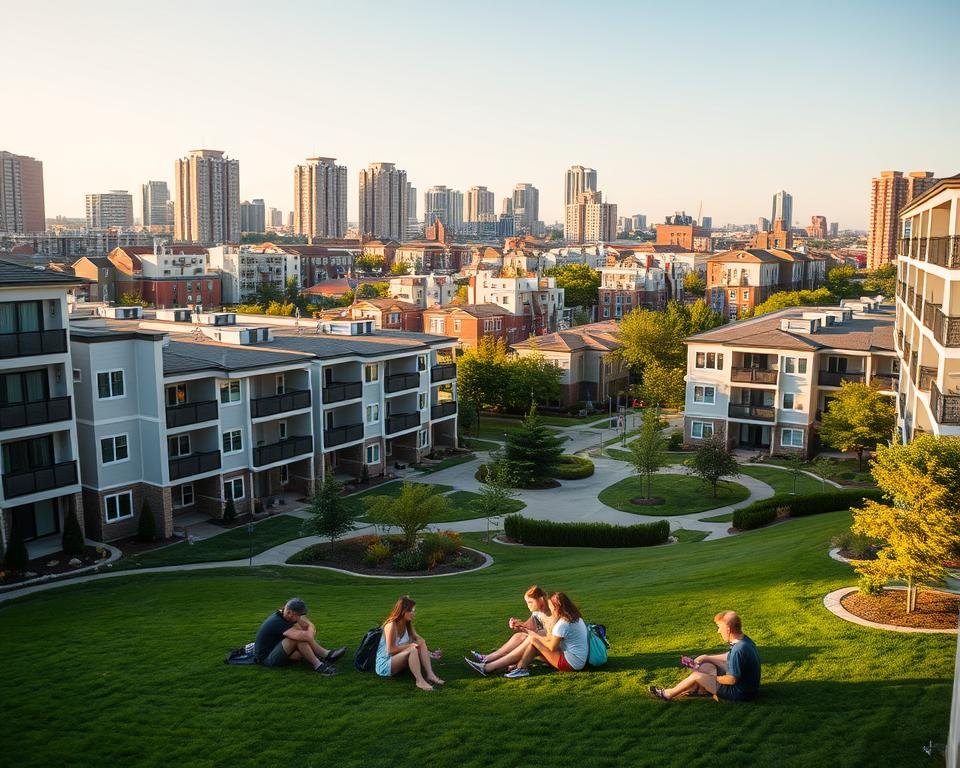How to Find Affordable Student Accommodation in Your Area

Imagine a first-year student arriving in a busy city, full of excitement. But, the thought of high accommodation prices makes their heart sink. Many students face this challenge as they look for affordable housing.
Finding student accommodation that fits your budget is key. This is even more important in big cities across the UK, where costs are rising. We aim to help you find affordable housing that suits your needs without breaking the bank.
- Understanding the Cost of Living for Students
- How to Find Student Accommodation in Cost of Living
- Exploring Various Student Housing Options
- Tips for Finding Student Accommodation
- Budget-Friendly Student Accommodation Strategies
- Best Locations for Student Housing
- Accommodation Cost for Students: A Comparison
- Cost-Effective Living Arrangements
- Long-Term vs. Short-Term Accommodation Solutions
Understanding the Cost of Living for Students
The cost of living for students changes a lot. It depends on where you live, what you eat, how you travel, and what you do for fun. Knowing these things helps students plan their money better while they study. We'll look at what affects accommodation costs and give an overview of living expenses in big student cities.
Factors Influencing Accommodation Costs
Several things affect how much students pay for accommodation. Key factors include:
- Location: Being close to universities, public transport, and shops can raise rent.
- Type of Accommodation: University halls might be cheaper than private flats. Shared flats are often less expensive than single rooms.
- Demand: Places with lots of students tend to have higher prices because there's more competition for homes.
Average Cost of Living in Major Student Cities
It's important to know the average living costs in student cities to make a good budget. Here's a table showing what students might spend each month in different UK cities:
| City | Average Rent (£) | Utilities (£) | Transportation (£) | Total Monthly Cost (£) |
|---|---|---|---|---|
| London | 1,200 | 150 | 150 | 1,500 |
| Manchester | 800 | 120 | 100 | 1,120 |
| Edinburgh | 900 | 130 | 120 | 1,250 |
| Birmingham | 750 | 110 | 90 | 950 |
| Cardiff | 700 | 100 | 80 | 880 |

How to Find Student Accommodation in Cost of Living
Finding the right student accommodation can be tough. It's important to know the local rental markets well. This way, you can find places that fit your budget and needs.
Researching Local Rental Markets
Start by looking at websites that focus on student housing. These sites give you details on prices and trends. Also, check local newspapers for hidden gems.
Real estate agents are a big help. They know the area well and can find places that match your budget and lifestyle. Knowing the market helps you find a great place to live while studying.
Identifying Key Areas for Student Housing
Look for areas with a lively social scene and good transport links. These places are close to university facilities. They offer a comfortable and engaging lifestyle.
Stay updated on trends and prices in these areas. Talking to current students can also help. They can share their experiences and guide you to the best spots.

Exploring Various Student Housing Options
Finding the right place to live is key to a good student life. There are many housing options, each with its own pros and cons. Knowing these can help you choose wisely when looking for university accommodation.
University Accommodation: Pros and Cons
University housing is convenient and supportive for students. It's close to classes and university facilities. But, it might limit your social life and not fit everyone's taste.
Private rentals can be cheaper and offer different living experiences. Shared housing, on the other hand, can help you make friends. Think about location and costs when deciding between these options.
Halls of Residence and Their Benefits
Halls of residence are popular among students. They offer a community feel and amenities for students. Benefits include social events, study spaces, and inclusive bills. Learn more about these options in this detailed guide.

| Accommodation Type | Pros | Cons |
|---|---|---|
| University Accommodation | Convenient, community-focused | Limited flexibility, fixed amenities |
| Private Rentals | Potentially lower costs, diverse environments | Higher relocation and management duties |
| Shared Housing | Socially engaging, budget-friendly | Variable compatibility with housemates |
| Halls of Residence | Community aspects, inclusive utilities | Restricted independence, mixed living standards |
Tips for Finding Student Accommodation
Finding the right student accommodation can feel daunting. But, with a smart plan, it becomes easier. Online tools and social media groups are key to finding your perfect home.
Essential Online Resources for Your Search
Use big websites like Rightmove, Zoopla, and Spareroom for student housing. They have lots of listings and easy filters for your needs. Also, check your university's website for special deals not found elsewhere.
Spending time on different websites helps you see more options. This way, you can find the best place to live.
Join social media groups for housing to talk to landlords and other students. Facebook and Reddit have groups with up-to-date listings. Being active in these groups can lead you to great places and tips from others.
Budget-Friendly Student Accommodation Strategies
Finding affordable student housing needs smart planning and knowing the rental market well. Students can cut costs by negotiating better deals and understanding rental contracts. This part covers key tips for talking to landlords and getting the most out of contracts.
Negotiating Rent Prices with Landlords
Many students miss the chance to talk down rent prices. Landlords often expect some negotiation, which is more likely if the property has been listed for a while. It's wise to research local rental prices first. Here are some tips:
- Be polite and professional during negotiations.
- Highlight your reliability by showing references or a guarantor.
- Propose a longer lease for a lower monthly cost.
- Point out any maintenance needs to support a lower offer.
Understanding Rental Agreements and Deposits
It's crucial to understand all parts of a rental agreement before signing. This ensures you're not agreeing to bad terms. Rental agreements outline your responsibilities, payment plans, and notice periods. Deposits, usually one month's rent, protect against damage or unpaid rent. Keep these points in mind:
- Read every clause carefully and ask for explanations on unclear parts.
- Keep a copy of the signed agreement for your records.
- Take photos of the property's condition before moving in.
Best Locations for Student Housing
Finding the right place to live is key for a good university experience. Being close to campus means less travel time. It also makes it easier to get to libraries, study spots, and social events. Plus, having nearby amenities adds a lot to student life.
Proximity to Campus and Amenities
Living near campus has many benefits. It saves time and lets you join in more campus activities. Look for areas with a lively atmosphere and important services nearby. Places with shops, cafes, and transport links are perfect for students.
Being close to key amenities makes life easier and improves your university experience.
Safe and Affordable Neighbourhoods
Safety is a top priority for students looking for housing. Look for areas known for being safe and affordable. Check crime rates and ask current residents for their thoughts. Safe, affordable places with strong community support are great for students.
Here is a table showcasing some popular cities in the UK that provide optimal options for student housing:
| City | Safety Rating | Average Rent (£) | Proximity to Campus (Miles) |
|---|---|---|---|
| London | Good | 1,200 | 1.5 |
| Manchester | Moderate | 800 | 2.0 |
| Bristol | Excellent | 900 | 1.0 |
| Edinburgh | Good | 850 | 1.2 |
Accommodation Cost for Students: A Comparison
Finding the right student housing means knowing the costs in different places. Each city has its own price tag, making it key to compare costs. Looking at local rentals, amenities, and living expenses helps make smart choices.
How to Analyse Costs of Different Areas
Start by researching the areas you're thinking of for housing. Knowing the local rental trends helps figure out typical costs. Several factors affect these costs:
- Proximity to educational institutions: Places near campus usually cost more.
- Demand and supply: High demand can push prices up, affecting student housing costs.
- Amenities available: Better transport, cafes, and entertainment can mean higher living costs.
Using Tools for Comparing Rental Prices
Many tools and platforms help compare accommodation costs. They make it easier to track and compare prices:
- Online rental listings: Sites like Rightmove and Zoopla have detailed pricing info.
- Rental price calculators: Some platforms offer calculators to check affordability based on budget and area.
- Historical data analysis: Tools like Rentometer show rent trends over time, helping understand cost changes.
Cost-Effective Living Arrangements
Students on a tight budget need affordable living options. The right place to live can really help with money. Flatshares are a great way to split costs and live together.
Flatsharing is a smart choice for saving money. It means sharing a home, which lowers rent and bills. Plus, it's a chance to make friends and feel supported.
But, picking the right flatmates is key. You want to live with people who get along well.
Finding Unfurnished vs. Furnished Options
It's important to know the difference between unfurnished and furnished flats. Furnished flats are easy to move into because they come with everything. But, unfurnished flats can save money and let you choose your own stuff.
Unfurnished flats might cost less at first. But, you'll need to buy your own furniture and appliances. Think about what you need and can afford before deciding.
Long-Term vs. Short-Term Accommodation Solutions
Understanding the difference between long-term and short-term student housing is key. Long-term options are for those wanting a stable home for their studies. They often cost less over time, which is good for students planning to stay long.
Short-term housing, on the other hand, is flexible for students with changing needs. It's great for internships or breaks. But, it might cost more each month, which is something to think about if you're watching your budget.
Your choice depends on your personal and academic needs. If you need a steady place, long-term housing might be best. But, if your studies change often, short-term housing could be more flexible. It helps you find a place that suits your lifestyle.
If you want to know other articles similar to How to Find Affordable Student Accommodation in Your Area You can visit the category Abroad.

Leave a Reply